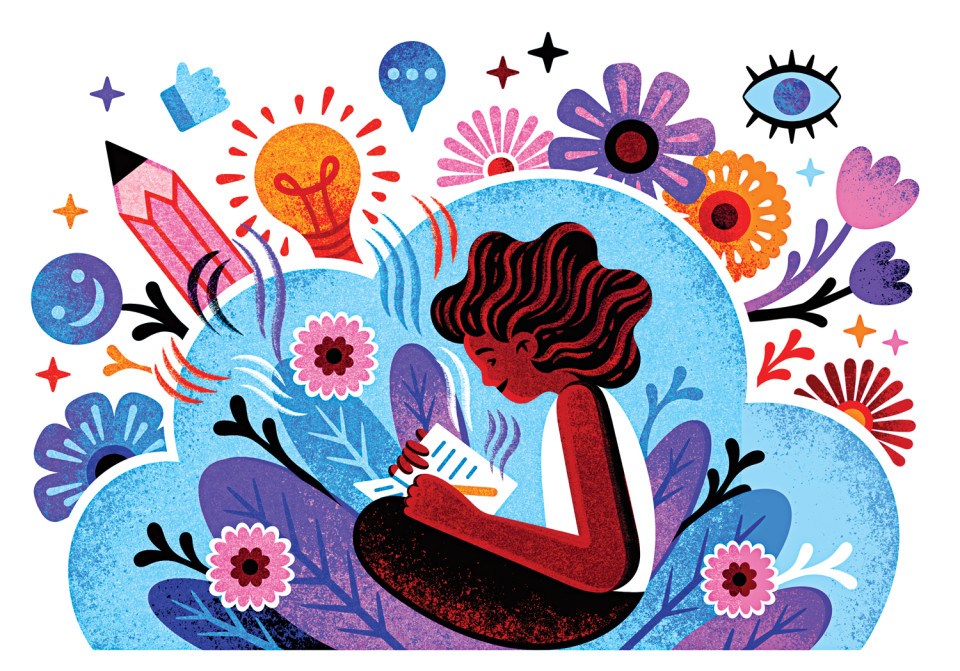The Power of — and Problems With — Lucky Girl Syndrome
Setting affirmations to manifest one’s goals is all the rage. But does the practice work, or is it just delusion by another name?

Illustrations by Chanelle Nibbelink
Each morning, West Chester author and fourth-grade teacher Rebecca DiCicco looks in a mirror and recites a few words aloud. Sometimes they’re simple, like, “I am worthy of compassion and kindness”; other times, they’re almost commands: “I am going to speak kindly to myself when I feel frustrated.” At the core of each, though, is a reminder: “I am enough, as I am right now, in this moment.”
DiCicco’s journey toward self-love and acceptance didn’t start until her 30s, she tells me. She was never a “woo-woo” kind of person and would brush off the kinds of methods that many people similarly deem trite. “But I also wasn’t happy,” she says. “I wasn’t thriving.” So she decided to make a change, starting by integrating affirmations into her daily life. It wasn’t long before people began telling her that she seemed different — more glow-y, more confident, more loving to herself and others.
DiCicco, like many others at the moment, has a case of Lucky Girl Syndrome, a modern phenomenon in which believers claim that positive mantras and mind-sets can tangibly bend reality, the future, even the universe’s will in their favor. The self-help tactic began as — what else — a social media trend, thanks to New York-based influencer Laura Galebe. “I genuinely consider myself one of the luckiest people I know,” the Gen Zer says as she’s putting on makeup in a December 2022 TikTok. “I just always expect great things to happen to me, and so they do.”
While critics have linked the trend’s initial wave of popularity with the annual short-lived rush to remodel one’s life at the start of a new year, content tagged #luckygirlsyndrome continues to rake in views and likes across major platforms a year later. (TikTok videos using the hashtag have over a billion views collectively.) And though the notion has largely been debunked by mental health experts as little more than pseudoscience and marketing, believers — including DiCicco, Galebe, and a slew of Philadelphians — persist, crediting successes as small as unique thrift-store finds and as major as pregnancy and career opportunities to affirmative statements they repeat daily to transform their wildest dreams into reality.
As the world ushers in a wave of Lucky Girls, it seems worth asking: Do affirmations really work? Can we speak our desires into existence? Or is this all delusion — just toxic optimism repackaged with a pretty, privileged bow on top?
Lucky Girl Syndrome may be the shiniest iteration of positive self-talk, but experts agree that the thought process behind it is nothing new. “The most famous books that got people thinking in this direction were The Power of Positive Thinking, by Norman Vincent Peale, and The Seven Habits of Highly Effective People, by Stephen Covey,” says Mitchell Greene, founder of Haverford-based Greenepsych Clinical & Sport Psychology. “I think Lucky Girl Syndrome is just a modern-day version.”
The mid-to-late-20th century saw a surge of self-help books like Peale’s and Covey’s and, subsequently, the spread of concepts like the law of attraction — the belief that the energy of our thoughts, both positive and negative, can impact our lived experience — and the law of assumption, which states that whatever you believe to be true is true.
Even further back in time — centuries, in fact — many cultures expanded on the idea that a heightened awareness of one’s thoughts can impact both one’s psyche and experiences, says Yvette Sheline, a professor of psychiatry and behavioral research at the University of Pennsylvania. “The idea that you can have a mindfulness-based experience has been around in Buddhism for thousands of years,” she notes. It works, to a degree — behavioral science researchers have found increased cognitive performance when positive self-talk is involved.
Part of the appeal of Lucky Girl Syndrome and similar trends is the ease: Ask the universe, and you shall receive! But while optimism is proven to build resilience in certain environments, overreliance on a strategy constructed around pure chance can take the perception of power over our own lives out of our hands. “There’s a lot of research around the fact that positive self-talk does increase motivation, help people cultivate confidence, reduce stress, and improve self-esteem,” says Meghan Morley, a Fishtown-based licensed professional counselor and owner of virtual therapy practice Cognitive Pursuits. “While, yes, it is important to think positively, it is also important to give ourselves credit when things go well. It’s not necessarily the power of positive thinking that is helpful, but the power of helpful, adapted and realistic thinking that makes us behave in a way that’s in alignment with our values and moves us toward our goals.”
Plus, an unrelenting grip on positivity — toxic positivity, even — may be counterintuitive, creating an illusion of constant luck while neglecting powers at play that contribute to a person’s success, such as socioeconomics and white privilege. It’s why many mental health experts advocate practices grounded in reality and tailored goals. These include Penn psychology professor and “father of positive psychology” Martin Seligman’s exercise in identifying one’s own role in the positives of daily life as a way of increasing optimism, and the WOOP strategy (wish, outcome, obstacle, plan) of German academic and psychologist Gabriele Oettingen, whose research suggests that the human urge to fantasize and want for things can be useful but ultimately isn’t a sufficient long-term motivator for getting what you desire. To avoid wading too far into the waters of toxic positivity, Greene encourages recognition of “mind chatter,” or the second-guessing that often arises in performance-based situations: “It’s an acceptance-based approach. It’s not about how positive you are; it’s whether you can manage negativity and how you manage doubts.”
Modern culture publications from Refinery29 to Vox to Vogue seem to see what’s pulling the strings behind many of the new trends that center girlhood (think girl dinner, hot girl walks, tomato girls): marketing, algorithm, and data analysis. “Girl” is relatable. “Girl” is clickable. “Girl” is still vulnerable — perfect for garnering clicks with quick, often superficial content that promises to solve your biggest life problems now. “We are a culture that, because of the 90-second Instagram or TikTok videos, wants a quick fix,” Morley says. The Lucky Girl promise that the promotion or romantic interest you’ve wanted for so long is just a thought away is enough to keep your attention for as long as it can realistically be held. The intense balancing act that many manifestation believers are actually adhering to, though, likely won’t make its way across our screens. Many local Lucky Girls tell me that walking the tightrope of cognitive dissonance is demanding — balancing tongue-in-cheek delusion with the harsh reality of modern daily life, balancing the simplicity of this strategy with the complexity and fixedness of the mind, balancing the fun of a silly TikTok trend with the dangers of spiraling into self-loathing when one’s wishes don’t come true. Explaining all this, though, is much less likely to rack up likes than a cutesy infographic or a “Get Ready With Me” video in today’s attention economy.
Plus, the marketing of these trends makes them seem greater equalizers than they are. It’s true; anyone could do it. A brief search for “manifestation” or “affirmation” on TikTok or Instagram provides page upon page of easily repeatable mantras and digestible minute-and-a-half explanations of how it all works. It also reveals countless testimonials by über-wealthy celebrities and influencers — often thin, white, conventionally attractive ones with six-figure follower counts. To the experts who see past the shiny veneer, the missing link between thoughts of fortune and actual fortunate lived experiences is quite simple and yet rarely acknowledged.
“It does ignore privilege and systemic barriers,” Morley says. “You got lucky, but you got lucky because you are in a position to get lucky.”
Former believers turned skeptics of the trends can see through it, too. Medford resident Hannah Gears grew up believing in fate and dabbled in affirmations in her adult life. Though she grappled with depression and anxiety, her trust that “Everything’s meant to be” remained. Then came a three-year struggle with infertility.
“I cannot tell you how infuriating it is to hear people say that you can manifest whatever you want when I’m in this very crappy situation,” she says. “Science is simply not on my side.” Two attempted IVF cycles, she tells me, completely failed. “People have said, ‘Hannah, you have to have a good attitude. Otherwise, this isn’t gonna work.’ Or, ‘If you want a baby badly enough, you will get pregnant.’ That made me feel like an asshole for ever saying that everything was meant to be to someone.”
For many like Gears, Lucky Girl Syndrome can easily give way to spiraling self-hate, making experts even more wary of its current prevalence. As Greene explains it, negative emotions like doubt and anxiety are a normal part of life — essentially a holdover from prehistoric times, protecting us from things that could cause us harm. While the allure of trendy iterations of positive self-talk is often the inherent ease, changing one’s mind is, in fact, a challenging task. Ignoring those entirely human reactions and applying a smiling facade over difficult emotions and events can cause us to blame ourselves when things don’t work out, or to fall apart when bad luck inevitably comes around.

And when it comes down to it, the kind of positive self-talk that’s actually beneficial and productive requires more effort than simply reading positive quotes and saving Instagram reels. “Lucky Girl Syndrome has a lot to do with unpacking and acknowledging the bad stuff about ourselves so we can release it and attract an abundant lifestyle,” says Delilah Dee Cruz, a local marketing strategist and event coordinator who uses affirmations in both her daily life and with clients.
“If we get down to the basis of how we learn new things, we are literally creating new neural pathways in our brains,” adds Beth Geddio, owner of Grad Hospital-based affirmation candle shop State of Being. “If you’re being taught that you are not enough, that you are worthless, and you’re being taught that from a very young age, that is a very thick neural pathway that is ingrained in you. You have to build a new one.”
For Cruz, maintaining a careful relationship with social media is crucial to maintaining a positive mind-set. As a first-generation college student in the early days of blogging, she used social media to begin unpacking generational trauma and building what she calls her “abundant mind-set” — her belief that even though she hadn’t seen examples of certain accomplishments while she was growing up, they were still within her reach. “Social media can be used as a tool to really empower your thoughts. But you have to be intentional,” she says. “You need to take all the information with a grain of salt.”
After 10 years of daily work on her “abundant mind-set,” Cruz has no plans for giving up or slacking off, whether in the form of the content she creates or that which she consumes. And in this day and age, why would she? Even Hannah Gears can see the appeal. “We need something to cling to that’ll make us feel a little bit better about life,” she says. “People need to feel positive in order to keep going in a world like ours.”
In post-pandemic life, constant awareness of what’s going on around us has become normalized, Greene says. So have conversations around mental health. On one hand, it’s a therapist’s dream. “And on the other hand, of course, these trends come that I think can be a little misleading or a little bit farcical,” he says.
With the rising cost of living, doomscrolling as a common pastime of choice, a youth mental health crisis that only seems to worsen, and more seemingly unavoidable daily obstacles, what’s so wrong with trying to think and speak about yourself, your goals and your world more positively? “I’m not sure if I have specific affirmations or mantras, but I do think I have tried to change the way in which the voice inside my head speaks to myself,” admits South Philly resident Mia Gitzes. “When that voice does start to speak negatively, I actively try to redirect it to something positive. Even when things don’t turn out as I planned, I try to see it from a different perspective. Maybe things didn’t end up the way I planned because I know less about what I need than the universe does.”
Perhaps Lucky Girls aren’t lucky as much as they are open-minded, hopeful, and hungry to change their lives in more abundant and fulfilling ways. Perhaps unabashed optimism — that doesn’t require too much effort! — is a reasonable antidote to the challenges of modern living, and leaning a little into farce is just another way of believing that something good could happen, eventually.
I think, therefore I am — maybe, just maybe.
Published as “Wishful Thinking” in the 2024 issue of Be Well Philly.


